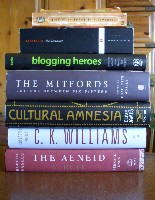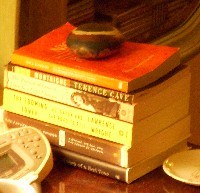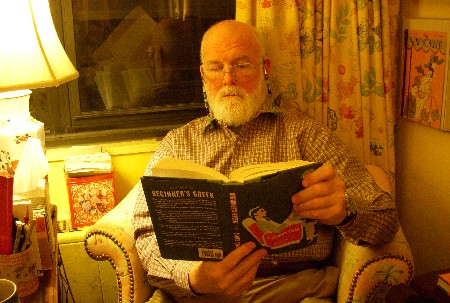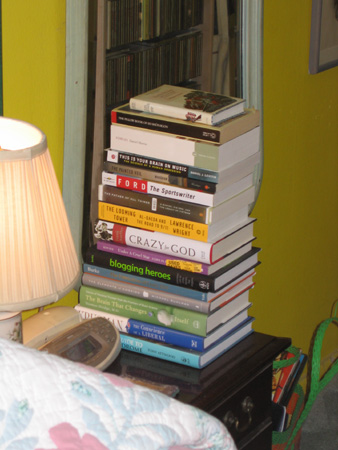 Greetings from the Learning Curve! I used the Dragon to dictate this morning’s read, and as a result the whole business took ages. I’ll get better at it, though. Dictation certainly beats trying to prop thick books open while typing from them. The thing is not to put the books away until they’ve been consulted for cleanup. I wonder: are there any conceptual artists out there who are “working with” unpasteurized dictation? Talk about absurdity on the cheap!
Greetings from the Learning Curve! I used the Dragon to dictate this morning’s read, and as a result the whole business took ages. I’ll get better at it, though. Dictation certainly beats trying to prop thick books open while typing from them. The thing is not to put the books away until they’ve been consulted for cleanup. I wonder: are there any conceptual artists out there who are “working with” unpasteurized dictation? Talk about absurdity on the cheap!
¶ The theme for stories on the Fourth Day of the Decameron is “those whose love ended unhappily.” The first tale, about Ghismonda, the daughter of a jealous prince, tells us that “she was youthful and vivacious, and she possessed rather more intelligence than a woman needs.” It’s curious that the story has never received operatic treatment. It has a climactic scene to rival Salome, followed by a kind of Liebestod. Before dying, however, Ghismonda rattles off the old medieval delusion about the wheel of fortune, so beloved perhaps because it offered the promise of respite from an increasingly stratified society.
Many kings, many great princes were once poor; many a ploughman or shepherd, not only in the past but in the present, was once exceedingly wealthy.
¶ The Aeneid: The Trojan fleet is set on fire, but most ships are saved in a providential thunderstorm. Aeneas is advised to leave the women and children behind while he sets out for Rome with just his fighting men. This seems to be the first appearance of women among the band of Trojan exiles; they’ve been introduced, not surprisingly, only to be got rid of.
¶ C K Williams, “To Listen”:
For the dead speak from affection, dream says, there’s kindness in the voices of the dead.
I listen again, but I still hear only fragments of the elaborate discourse the dead speak;
when I try to capture its gist more is effaced, there are only faded words strewn on the page
of my soul that won’t rest from its need to have what it thinks it can have from the dead.
Sometimes, I think that this is what poetry is for: memorizing lines that seem right even though they’re not understood; later, their sense becomes clear, enlightened by experiences that we would have missed without them.
¶ Clive James on Alfred Polgar:
Critics are always remembered best for how they sound when on the attack. Schadenfreude lies deep in the human soul, and to read a tough review seems a harmless way of indulging it. But the only critical attacks that really count are written in defense of value.
(In an interesting note: “Alfred Brendel put me onto Polgar.”)
¶ In September 1979, Diana writes Deborah to regret that she can’t come to Sophy’s wedding because her husband, Sir Oswald Mosley, is too ill to be left in France. “I will get her present next week, there’s a list at PJ isn’t there.” PJ stands for the stylish emporium in Sloane Square. Last night, Kathleen and I had dinner with the banker who lives right behind Peter Jones. Her life is being made a perfect hell by adjacent construction (nothing to do with the shop). The runaround that she gets while trying to find someone responsible to talk to sounds perfectly universal.
¶ Today’s Blogging Hero: Mike Masnick, of Techdirt. Aha! Someone else who claims to have been a blogger before there was blogging. An interesting thing about this business site is that its legitimacy is thought, correctly, I’m sure, to be enhanced by the presence of advertising. Some of the advertisers are clients of the firm!”
¶ Speaking of business, while slogging through an impenetrable passage having to do with commercial leases in Le rouge et le noir, I accepted the fact that I am going to have to get a trot. I can’t go on wondering if Stendhal is addicted to non sequiturs.

















